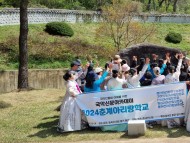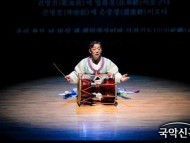2024.04.20 (토)
#MeToo in North and South Korea
- Michael Lammbra…
- 등록 2020.08.20 12:03
- 조회수 430

In South Korea
The monsoon season has finally ended in Korea. After 54 days of constant rainfall the season broke, and the forgotten heat of summer oppressively returned. As I walked down the vibrant, heat-soaked street between the high-rises, masked up of course, I couldn’t help but notice what seems to be the latest fashion trend in Seoul: ‘baggy pants’ or ‘baggy blue jeans.’ The sight of the pants made me sweat, but the young women didn’t seem to mind, rather it seemed to be a statement of some sort. In this heat, it was definitely a statement. As I asked around about the new look, a consensus began to form: "Young women were pushing back against the social expectations, driven by the desires of men (high heels, mini-skirts/tight pants), by dressing comfortably (flats, baggy pants).” Despite worldwide COVID-19 economic stagnation, as economic opportunities continue to grow for women in South Korea, so do their choices, and wearing of baggy pants is just one subtle example of that choice. The politics of dress recently took centered stage when a South Korean lawmaker, Ryu Ho-jeong, was harshly criticized for wearing an outfit (one-piece dress) to the National Assembly.
Economic disparity between males and females in South Korea ranks last in the OECD with a considerable gap between the sexes. In South Korea’s male-oriented society women are expected only to marry a high-status spouse and raise a family. But women in South Korea have been quietly rebelling. Nightmare stories of married life don’t help: holidays with in-laws (시월드), unending housework, and the new stigma of being a "Mom Insect” (맘충) has many women putting off marriage (only marrying for love) or not getting married altogether.
The bestselling novel "Kim Ji-young: Born 1982” and now recently released film on Netflix follows Kim J-young, an ordinary 30-something South Korean woman, facing the uneven reality of being a woman in modern-day South Korea. The Guardian referred to the novel by Choo Nam-joo as the "South Korean #MeToo bestseller” and the BBC labeled it a "Feminist” film. Sexual harassment in the workplace continues to plague high level officials in South Korea with the Mayor Busan (South Korea’s second largest city) resigning this past spring, and the Mayor of Seoul allegedly committing suicide due to #MeToo cases. A combination of newfound economic independence provides choices that never existed before. Quite simply young women in South Korea are not getting married, a trend that also exists in North Korea.
In North Korea
Through direct accounts from North Korean defectors, "The Daily Lives of North Koreans,” published in March of this year, details daily life trends north of the border. In North Korea the pressure to marry and do your duty for your country is quite similar to the South with women who are not married regarded as "non-existent” (with no status).
Economic pressures in North Korea, with the introduction of a black-market economy to account for market failures, has also provided women with new choices: arranged marriages are now declining and marriages for love are on the rise. A 53-year-old defector who left in 2013 stated, "In general, women don’t want to get married. Because men flip over the table, yell and hit women. Even if women ride their bikes and work, they can't even make enough money to eat rice. But if my husband says he wants to drink some alcohol I must prepare everything for him. I think it’s best for women to make our own money and eat plenty of porridge. That's what I think.”
According to North Korea's 2008 official census, almost everyone is married and has a spouse in North Korea by their late thirties. But statistics can be deceiving. Many who were once initially married but later separated never report their new status to the authorities. Unlike in South Korea it is illegal to co-habit in North Korea without a marriage license and officials will punish violators who do not carry the proper documentation. But since marriage is expensive and requires significant economic status to get married, more and more men and women live together without following official procedures. North Korean defectors say, "Some people live together because they love each other, some people live together because their parents prohibit their marriage, and others do it for economic survival. Unlike before, I don't think there are many good things about a woman getting married. This is because women have a low status in the family, the male-centered culture remains.”
Reuter’s reported South Korea’s birth rate is the lowest in the world at 1.1 per woman out of 201 countries surveyed and North Korea isn’t far ahead at 1.91 per woman. With no end in sight to the COVID-19 pandemic the uncertainty of South Korea’s economic future will likely further postpone decisions to marry, raise children, or even date. With the world on pause as we seek to adapt and overcome the COVID-19 crisis Korean women have not stopped their battle against socio-economic inequality using online communities to support one another and organize campaigns. One keep but help but wonder if North and South Korean women are working together.
- [] 제32회 전국청소년민속예술경연대회(05/18)
- [] 제42회 전주대사습놀이 학생전국대회(5/18∼6/2)
- [] 제50회 전주대사습놀이 전국대회(5/18~6/3)
- [] 제4회 함양 전국국악경연대회(05/12)
- [] 제18회 대한민국 전통예술무용·연희대제전(06/09)<br>무용(전통무용…
- [] 제48회 부산동래 전국전통예술경연대회(06/15-16)(무용.기악)
- [] 제1회충남전국청소년국악경연대회(05/04)(판소리.기악.타악)
- [] <br>[광주]제21회 대한민국 가야금병창대제전(06/16)
- [] 제18회 과천전국경기소리경창대회(05/04)
- 제11회곡성 통일전국종합예술대전(06/15-16)
- [] 제24회 인천국악대제전 전국국악경연대회(05/25-26)
- [] 제26회 창원야철전국국악대전(07/06- 07)
- [] 2024 무안장애인 승달국악대제전(06/01-02)
- [] 제22회 무안전국승달국악대제전(06/01-02)
- [] 제10회 전국공주아리랑민요경창대회(05/26)
- [] 제17회 상주전국국악경연대회(05/19)(성악/무용·연희/기악)
- [] 제10회 전국밀양아리랑경창대회(05/26)
- [] 제21회 강남전국국악경연대회(05/22)(무용/타악/판소리/민요)
- [] 제26회 서편제보성소리축제 전국판소리 고수 경연대회(05/04-05)
- [] [순천]제10회 낙안읍성 전국 국악대전(04/27-28)
- [] 제29회 안산전국청소년국악경연대회(05/26)
- [] 제26회(통합58회) 여수진남전국국악경연대회(05/18-19)
- [] 제51회 대한민국 춘향국악대전 경연대회(05/05)(05/11-12)
- [] 제33회 고령전국우륵가야금경연대회(04/26-27)
- [] [부평]제8회 전국 청소년국악경연대회(05/11)(관악/현악/성악)
- [] 제22회 구례전국가야금경연대회(05/04-05)
- [완도]제24회 장보고국악대전 전국경연대회(05/05-06)(무용/판소리…
- [] 제4회 금천정조대왕맞이전국청소년국악경연대회(04/13-14)
- [] [세종시]제10회 통일기원 세종전국국악경연대회(04/06-07)
-

[금요연재] 도자의 여로(141)<br>분청상감대호편
작지만 문양이 이채로워 이규진(편고재 주인) 명품 청자를 생산했던 강진과 부안이 쇠퇴한 원인으로는 여러 가지를 들 수 있다. 그 중에는 고려 말의 혼란한 정국이라든...
-

[수요연재] 한글서예로 읽는 우리음악 사설(188)<br>원주어리랑, 산은 멀고 골은…
원주어리랑을 쓰다. 한얼이종선 (2024, 문양지에 먹, 34 × 34cm) 어리랑 어리랑 어러리요 어리랑 고개로 넘어간다. ...
-

[수요연재] 이무성 화백의 춤새(87)<br> 정인삼 명인의 '신칼대신무' 춤사위
신칼대신무 신칼대신무는 무속장단과 巫具를 활용한 재인의 춤으로, 장단과 움직임의 법도 있는 만남을 잘 보여주는 춤이다. 구한말 화성재인청에서 가르친 50여 가지의...
-

[화요연재] 무세중과 전위예술(9) <BR>김세중의 한국민속가면무극 춤사위 발표회19…
멍석 위에서 민속극에 뜻을 둔 이래 가장 절실했던 것은 둔한 몸을 가지고 직접 춤을 익혀야 한다는 것이다. 우리들 생활의 분신의 하나인 전통 민속극과 좀처럼 사귀어...
-

[월요연재] 이윤선의 남도문화 기행(140)<br>잔인한 적군의 시신까지 거든 바다의…
왜덕산(倭德山)의 비밀 피아를 나누지 않고 위령 바다사람들 심성 깃들어 왜군에도 그러해야 했던 섬과 바다의 민속 관념은 인류의 박애 정신 아닐까 교착상태 빠진 한·일 문...
-

[수요연재] 한글서예로 읽는 우리음악 사설(188)
갑진년 사월에 강원도 아리랑을 쓰다 오거서루주인 이종선 (2024, 한지에 먹,48 × 56cm) ...
-

[Pick리뷰] 이 시대의 새로운 춘향가- ‘틂:Lost&Found’
2024 쿼드초이스_틂 (사진=서울문화재단 대학로극장 쿼드 나승렬) [국악신문 정수현 전문기자]=대학로극장 쿼드의 ‘쿼드초이스’...
-

[Pick리뷰] 세 악단의 조화로운 하모니, ‘하나 되어’
지난 4일, 국립국악원은 국립국악원 창작악단, KBS국악관현악단, 전북특별자치도립국악원 관현악단 118명으로 구성된 연합 관현악단 무대 ‘하나되어’를 국...
-

[인터뷰] 김경혜의 '시간의 얼굴' 작품전, 16일 개막
칠순을 넘어서는 길목에서 중견작가 김경혜(영남이공대 명예교수) 작가의 열번째 작품전이 오는 16일부터 25일까지 10일간 대구시 중구 슈바빙 갤러리에서 열린다.전시되는총 50여 개...
-

[Pick리뷰] 국립국악관현악단의 관현악시리즈 III ‘한국의 숨결’
국립국악관현악단의 관현악시리즈 III ‘한국의 숨결’이 KBS국악관현악단 상임지휘자 박상후의 지휘로 국립극장 해오름극장에서 펼쳐졌다. (사진=국립국악관현악단...
-

[PICK인터뷰] 국악인생 60여년, 한상일 대구시립국악단 예술감독
한상일(1955~) 대구시립국악단 예술감독 및 상임지휘자는 국악에 입문한 지 올해로 60여 년을 맞는다. 때 맞춰 지난 1월 25일 서울문화투데이 신문에서 선정하는 제15회 문화대...
-

[Pick리뷰] 명연주자 시리즈 ‘국악관현악-공존(共存)’
[국악신문 정수현 전문기자]=지난 3월 22일, 세종문화회관 M씨어터에서 서울시국악관현악단 2024 명연주자 시리즈 ‘공존(共存)’ 무대가 펼쳐졌다. ‘명연주자 시리...
-

[Pick리뷰] 소리극 ‘두아-유월의 눈’
[국악신문 정수현 전문기자]=지난 12일부터 22일, 국립정동극장은 대표 기획공연 사업 ’창작ing’의 두 번째 작품, 소리극 ‘두아:유월의 눈’을 무대에 올렸다. ‘두아:...
-

한류의 의외의 원류? ‘일본아리랑’에 놀라
한국을 대표하는 음곡 ‘아리랑’. "아리랑 아리랑 아라리요 아리랑 고개를 넘어간다...”라는 노래다. 각종 스포츠 대회나 정상회담 만찬회 등 공식 행사에서는 어김없이 연주되...
-

[인터뷰] 이즘한글서예가전 신인작가 이광호 작가의 시선
봄바람을 타고 13일 인사동 한국미술관에서 개최되는 네번째이즘한글서예가전에서 출품한 30명의 작가 중 가장 젊은 신인작가라고 한얼 회장이 소개를 한 3분의 작가 중 이광호(43세)...
-

[Pick리뷰] 전통 탄탄한 국악관현악: ‘작곡가 이강덕
[국악신문 정수현 전문기자] =국립국악원 창작악단은 지난 7~8일 기획공연 ‘작곡가 시리즈 Ⅲ’을 선보였다. 작곡가 시리즈는 창작국악의 토대가 된 작곡가를 선정해 의미를 되...






























